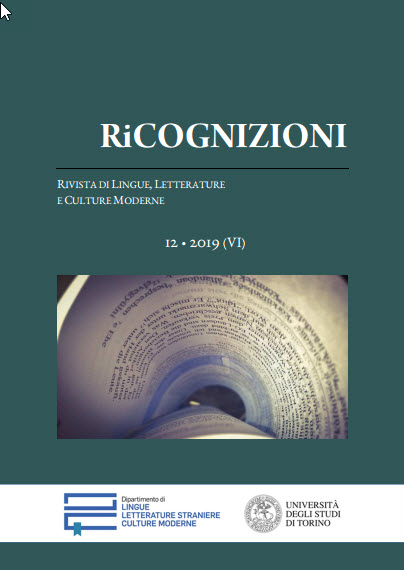L’APPROCCIO LINGUISTICO ALL’INTERTESTUALITÀ E LA SUA APPLICABILITÀ ALL’ANALISI INTERMEDIALE
DOI:
https://doi.org/10.13135/2384-8987/3639Parole chiave:
intertextuality, functions, intertextual paradigms, markers of intertextualityAbstract
In comparison to literary studies, in linguistics there has been relatively little focus on intertextuality since the beginning of postmodernism. While research into intertextuality from the perspective of literary studies often resulted in the search for motifs, linguists repeatedly reached their limits when searching for linguistic reference points for intertextuality. Thus, Coseriu defined "repeated speech" as not analyzable and excluded it from his further considerations. Through the repetition and reuse of texts and parts of texts in the same text or as part of new textual contexts, conditions are created which cannot be explained with simple linearity of the use of language. The phenomenon of the texts in the text refers to dependencies and breaks in coherence, the marking of which is just as problematic as their contribution to the requirements for understanding the text and thus to the constitution of the text's meaning. Some languages have developed specific means which must be mandatorily used when the content of what has been communicated comes from a foreign source and not from one's own reflection. Since the need to mark the origin of the speaker’s knowledge seems to exist in all languages, these studies have also been extended to European languages in recent years. New possibilities for investigating the forms and functions of intertextuality also arise from the ease with which linguistic constructions can be found in corpora. These possibilities have not yet been developed for the analysis of multimodal language productions. Some considerations in this regard shall be presented##submission.downloads##
Pubblicato
2019-12-30
Come citare
Hassler, G. (2019). L’APPROCCIO LINGUISTICO ALL’INTERTESTUALITÀ E LA SUA APPLICABILITÀ ALL’ANALISI INTERMEDIALE. RiCOGNIZIONI. Rivista Di Lingue E Letterature Straniere E Culture Moderne, 6(12), 29–51. https://doi.org/10.13135/2384-8987/3639
Fascicolo
Sezione
CrOCEVIA
Licenza
Gli autori che pubblicano su questa rivista accettano le seguenti condizioni:- Gli autori mantengono i diritti sulla loro opera e cedono alla rivista il diritto di prima pubblicazione dell'opera, contemporaneamente licenziata sotto una Licenza Creative Commons - Attribuzione che permette ad altri di condividere l'opera indicando la paternità intellettuale e la prima pubblicazione su questa rivista.
- Gli autori possono aderire ad altri accordi di licenza non esclusiva per la distribuzione della versione dell'opera pubblicata (es. depositarla in un archivio istituzionale o pubblicarla in una monografia), a patto di indicare che la prima pubblicazione è avvenuta su questa rivista.
- Gli autori possono diffondere la loro opera online (es. in repository istituzionali o nel loro sito web) prima e durante il processo di submission, poiché può portare a scambi produttivi e aumentare le citazioni dell'opera pubblicata (Vedi The Effect of Open Access).








